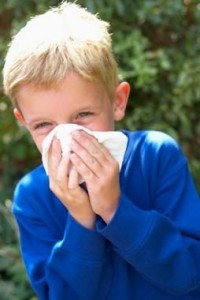A person suffering from nasal congestion usually has mucus in his nasal passages that hinder the flow of air to via the passageways. A nasal congestion may cause a lot of discomfort to your child as it may inhibit him or her from breathing properly.
This is not typically referred to a serious emergency, however, if the cause of the congestion is an allergy or affects the child’s ability to breathe training in first aid can be extremely beneficial.
Causes
Common causes of nasal congestion in toddles, babies and young children include flu, colds and allergies. It is important to note that colds are often caused by viruses, thus making antibiotics ineffective. Due to new strains of 
Symptoms
Common signs and symptoms of nasal congestion in children include:
- Nasal discharge
- Runny nose or stuffy nose
- Posterior nasal drip
- Pain in the sinuses
- Facial pain
- Cough
- Sore throat
- Reddened eyes
- Fever
- Breathing difficulty
When to seek medical attention
See your doctor if:
- Your child is three months or younger
- Symptoms of the congestion last for more than two weeks
- Your child is suffering from a severe cough or is coughing in a barking sound
- Your child is suffering from ear pain
- Your child is suffering from fever along with cough
- Your child’s breathing patterns seems altered or too fast
How will the doctor treat nasal congestion in your child?
The treatment method implemented by your doctor will solely depend on the underlying cause of the nasal or sinus congestion in your child. Your doctor will prescribe oral fluids, humidifiers, saltwater nasal spray, cough suppressants, antihistamines, decongestants and acetaminophen. People with sinusitis may be advised to take antibiotics for treatment.
Treatment
1. Call 911 immediately if:
- Your child is suffering from breathing difficulties
- Your child seems to be out of breath
- Your child starts coughing suddenly after eating or being fed
- The congestion is accompanied with cough and bluish skin discolouration or any other forms of skin changes
- Your child is not able to perform daily activities, eat or even talk
2. Clear the mucus from the nose
- You can use an aspirator or an infant nasal bulb to suck out the mucus from the child’s nose
- Ask your child to blow his or her nose frequently, if your child is able to do so
- Do NOT give your child cough or cold medicine if he or she is under 6 years of age, unless your child’s paediatrician advises it
3. Give your child plenty of fluids
- For children over 3 months old, apple juice can be given
- For older children, other drinks such as warm soups such as chicken soup can be given
4. Humidify the air
- If the air is dry, a cool-mist humidifier should be used
- You can moisten your child’s nasal passages with saline nose drops
- You may sit near a shower with hot water running and have your child sit on your lap. Do not sit too close to the shower as the water may burn your child’s skin
5. Treat other symptoms of the condition
- For children older than 1 year, ½ to 1 teaspoon of honey can be given to treat cough. Avoid giving cough medication
- Keep your child away from cigarette smoke and other irritants
- Petroleum jelly can be rubbed under the nose in order to reduce chapping
- In case of allergies, consult your paediatrician about the necessary treatment
Learn More
To learn more about serious breathing emergencies and allergic reactions enrol in a first aid course with a credible provider (more information).
